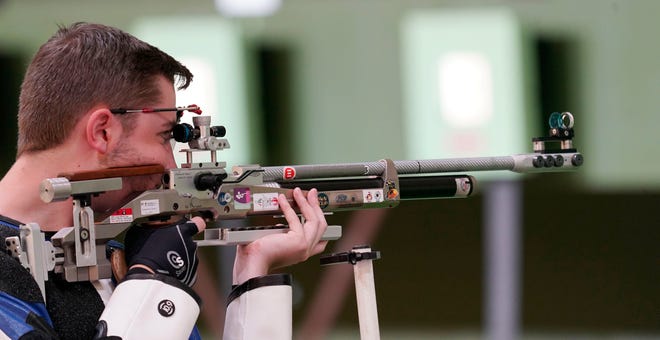
This year in Hamilton County, 15 juveniles have been charged with murder, more than were charged in the last four years combined. Why the increase? 'Kids Who Kill,' The Enquirer's series on juvenile violence, continues with this conversation.
Hamilton County Juvenile Judge Melissa Powers has been a Juvenile Court judge since 2017. Before that, she was an assistant Hamilton County prosecutor who handled juvenile cases and later, in private practice, defended juveniles. She then served as a Hamilton County Municipal Court judge for 10 years.
Enquirer reporter Kevin Grasha: Let’s talk about guns.
Judge Melissa Powers: Guns have always been a problem.
It used to be that (guns) were more associated with drug trafficking. Now we’re seeing, particularly in juvenile court, it may have nothing to do with drugs. It could be a post on social media, for example, that escalates the situation. And the way it’s handled is through gun violence.
Where are they coming from and why are they so easy to get?
You’ll hear Cincinnati Police Chief Eliot Isaac talk about community guns. But also they’re stealing them. They’re stealing them out of cars and out of homes. Almost all the guns are stolen – that’s one thing that I see. Obviously, they can’t buy them.
That’s a huge difference. It used to be that I’d only see kids with stolen cars and maybe a high-speed chase. Now, it’s stolen cars and guns and then the shootings – drive-by shootings, murder cases. We’re all shaking our heads, just like everybody else, with regard to how young a child can be who handles a gun. It’s not unusual for a child to be handling a gun around the age of 12 or 13.
I remember when I was in the prosecutor’s office, in the early ‘90s, and I’d go around to different schools to talk about safety, and they would bring a gun board, showing all the guns that were taken from suspects. And we would ask students, how many of you have ever seen a gun? And very few hands would go up.
Now, it’s not unusual for them to be handling a gun. And they’re typically not coming from the home. They’re being stolen, and then they’re getting their hands on them. And then these guns are being used to commit crimes – from aggravated robberies to felonious assaults to murders.
It’s not unusual for the court to see 12-year-olds robbing delivery drivers with a firearm. There was a ring that I had, from Westwood. Four or five kids. And one of them had a firearm. And they were robbing for food. And they ate the food.
Why do you think we’re seeing an increase in teen gun violence?
The pandemic has probably exacerbated the situation with violence. Obviously, this past year we’ve had a significant increase in violence – with young children, girls (which is unusual) and people with no records whatsoever getting involved. Then we have the type of child who has been in the criminal justice system for quite a while.
The increase is so significant, mainly because of the pandemic – children were not in school, were not involved in sports. Games, practices are being canceled, so there’s much more time on their hands. There’s a lot more isolation. A lot more involvement on social media.
And more just leads to more, I guess.
Trauma is significant. And I think we need to take a long, hard look at trauma and how to recover from adverse experiences. We see a lot of children who are exposed to violence. That could be in the home through domestic violence – which again, the pandemic increased the incidence of domestic violence. But it could also be exposure to violence in the community. It’s not unusual for a kid to know somebody who has been shot. It’s not unusual for them to have been shot. It’s not unusual for them to witness someone being shot or killed. So that exposure to violence is a very common trend, especially with those (juveniles) who are charged with murder.
I think it’s almost becoming the norm now, in certain communities, in certain neighborhoods, that this is the norm for them.
And the kids, their reaction to it – they’re numb to it. They don’t really react.
I remember the first time I asked someone in juvenile court – they had been shot – how did that affect your life? Has it changed your life or your perspective on life, in any way? But there was no reaction, whatsoever, really. It didn’t have an effect on their life – positive or negative. It was indifference.
I was surprised by that. I think I had more of an expectation that they would say, you know, I’ve turned my life around, I’ve found God, or I realized how lucky I am to be alive – but none of that was the reaction.
What’s at the root of this?
It’s complex. You’ve got societal issues – poverty, educational difficulties.
Then you’ve got the individual issues – children who experience so much trauma, it changes the chemistry of the brain.
I used to work with veterans in municipal court. And it’s very similar to being in war zone. When you have long-term stress and you're in situations where you’re not safe, you develop a fight or flight response. And the more trauma you have as a child, the more effect it has on the brain and on the body. Medical issues develop, as well.
We have a lot of mental illness that we’re dealing with, with young children, because of that chronic exposure to trauma. You’ve got to look at the home, not just the environment. You’ve got to look outside of economic opportunities and educational opportunities, how do we get the neighborhoods to be safe? You’ve got to focus on the individual. And what we try to do in juvenile court – these are more long-term – is to develop resiliency and broaden their strength, so that they can overcome their adverse childhood experiences. Make them stronger. So that they don’t fall into criminal thinking, using violence as their response – we’re trying to combat that fight or flight experience.
We’ve got to develop short-term, immediate response because we see so much going on, in our community, now.
Then you’ve got to come up with longer-term solutions. Juvenile court has been working on these. We’ve got strong partnerships with our community. With schools, mental health providers and professionals. We’ve been constantly focusing on trying to handle the trauma that the child has experienced, and then how can they recover from those adverse childhood experiences.
Our focus is to build their resiliency and help them recover from trauma.
How much of this is gang-related?
There are groups that are involved in organized criminal activity.
We also have neighborhoods that are territorial. And the kids that live in that neighborhood will defend anybody hurt in that neighborhood against another neighborhood. So they’re connected in that way.
And yet the defendants keep getting younger.
Everything we’re seeing is much younger – early drug use, early sexual activity, early access and handling of firearms.
We’re seeing girls charged with murder – we have three in the system now. A 13-year-old is our youngest.
Mental health issues during the pandemic, not only for children but for the parents, has gone up. Isolation, depression, anxiety… those are all up. We’re seeing with children even more psychiatric hospitalization. Multiple outpatient services the children will have. Emergency room visits – those are all up, I believe, because of the pandemic.
The one thing that a child needs is to be in school. Once they weren’t in school, we saw the problems develop. It gave them much more time on their hands to do things that get them in trouble, more time on social media.
The struggle, then, is keeping them in school?
We know that in the prison population, (the majority) don’t have a high school diploma. So besides a nurturing parent or family member or adult, school is the number one positive, pro-social place in a child's life. They have structure. They have discipline. They have responsibility. They have accountability. It also sets them up, so that they have a future of becoming financially independent – and break the bonds of poverty and be able to have a better life. The opposite is: Basically throw their life away and end up in the criminal justice system. So in juvenile court we focus a lot on school.
If we can get them to graduate from school and stay out of (Job and Family Services), we think we’re way ahead of the game long-term, for children.
Kids Who Kill:More teens are facing murder charges. How it came to this
The above conversation has been edited for clarity. Enquirer reporter Kevin Grasha recorded and transcribed the interview before editing. In some cases, questions and answers have been shortened and moved to make the conversations easier to follow and to remove unnecessary asides and repetitions.
Source link









